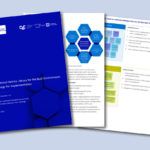The creation of a National Metrics Library for the UK’s built environment will help improve new and existing assets by making it easier to measure their performance, according to a new strategy paper by the Scottish Futures Trust and the Construction Innovation Hub (the Hub).
The performance of the built environment is vitally important to the country’s economy, wider society and net zero goals, as it currently accounts for 40% of energy use and 30% of greenhouse gases globally.
Across the built environment, clients, industry, and academia are exploring new ways to measure performance throughout an asset’s lifecycle. As the methods of design, construction and operation of our buildings and infrastructure becomes more complex, so to have the ways in which we define, document and analyse their performance.
The Scottish Futures Trust and the Construction Innovation Hub began to explore the potential benefits of a national metric library as a resource for the construction sector and the public sector in 2019. An industry working group was then set up to explore three options for delivery and make key recommendations for implementation.
Ian Nicholson, Construction Innovation Hub, Project Lead for the strategy paper, said: “The need for performance improvements across industry has never been greater. A National Metrics Library will facilitate greater collaboration, alignment and dissemination of performance measurement and sharing of best practice.”
The opportunity of a national metric library is to consolidate existing and future methods of measuring performance through a free to access central digital resources, that will enhance our approach to performance management in the built environment.

Paul Dodd, Scottish Futures Trust’s Head of Infrastructure Technology and Improving Project Delivery, and also Chair of the working group explained: “We need to measure so many aspects of our built environment, such as maintenance costs, indoor environment quality, social impact and whole life carbon, in order to benchmark, learn and improve performance. This complex area of performance will continue to evolve and a central resource to consolidate metrics will support learning and industry capability.”
The working group’s recommendation — to create a National Metrics Library to help address these issues — will now be considered by professional institutions to develop a plan for development and launch.
The proposed National Metrics Library will be a resource and repository for quantitative and qualitative performance metrics which will be open to all industry and client bodies, and unbiased towards any industry methodologies. A user-friendly digital interface will ensure it will be accessible to all.
Paul added: “The National Metrics Library will be a place where users can easily identify things they can measure to assess the performance of their assets, along with details on how to measure them. It will support coordination, innovation, knowledge sharing and dissemination of best practice to improve how we measure sustainable performance across the asset lifecycle. We hope this national resource will support the performance standards of our built environment, which will be of benefit to business, the overall economy, our net zero goals and society.”











